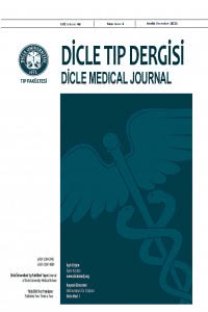Farmakovijilans ve Advers Etkilerin Raporlanması Üzerine Diş Hekimlerinin Görüşlerinin Araştırılması
Investigation of Dentists' Opinions on Pharmacovigilance and Reporting of Adverse Effects
___
- 1. Kumar A. Pharmacovigilance: Importance, concepts, and processes. Am J Health Syst Pharm 2012; 74: 606- 12.
- 2. Edwards IR, Aronson JK. Adverse drug reactions: definitions, diagnosis, and management. The Lancet 2000; 356: 1255-9.
- 3. Kongkaew C, Noyce PR, Ashcroft DM. Hospital admissions associated with adverse drug reactions: a systemic review of prospective observationalstudies. The annals of pharmacotherapy 2008; 42: 1017-25.
- 4. Kulkarni MD, Baig MS, Chandaliya KC, et al. Knowledge, attitude and practice of pharmacovigilance among prescribers of government medical college and hospital, Aurangabad (Maharashtra). Int J Pharm Ther 2013; 3:10-8.
- 5. Caduff-Janosa P. Lost in regulation. Pharmacovigilance. Springer 2017; 9-19.
- 6. World Health Organization. Pharmacovigilance (cited 2019); Available from: https://www.who.int/medicines/areas/quality_safet y/safety_efficacy/pharmvigi/en/.
- 7. The Uppsala Monitoring Center. The story of UMC and the WHO Programme 2018 (cited 02 Şubat 2018). Available from: https://www.who-umc.org/globalpharmacovigilance/ who-programme/the-story-ofumc- and-the-who-programme/.
- 8. TUFAM activities, Available from: https://www.titck.gov.tr/faaliyetalanlari/ilac/18 (Access date: 1 Sep 2021).
- 9. World Health Organization. Safety monitoring of medicinal products: guidelines for setting up and running a pharmacovigilance centre. World Health Organization and the Uppsala Monitoring Centre, Available online: www who-umc org/graphics/4807 pdf. 2000.
- 10. Ozcan G, Aykac E, Kasap Y, et al. Adverse drug reaction reporting pattern in Turkey: analysis of the national database in the context of the first pharmacovigilance legislation. Drugs-Real World Outcomes 2016; 3: 33-43.
- 11. Alan S, Öztürk M, Gökyıldız S, et al. An evaluation of knowledge of pharmacovigilance among nurses and midwives in Turkey. Indian J Pharmacol 2013; 45: 616- 8.
- 12. Vural F, Çiftçi S, Vural B. The knowledge, attitude and behaviours of nurses about pharmacovigilance, adverse drug reaction and adverse event reporting in a state hospital. NortClin Istanbul 2014; 1: 147-52.
- 13. Smith RG, Burtner AP. Oral side-effects of the most frequently prescribed drugs. Spec Care Dentist 1994; 14: 96–102. DOI: 10.1111/ j.1754- 4505.1994.tb01112.x.
- 14. Karataş Y, Khan Z, Ozagil EZ, et al. Knowledge, attitude and practices about pharmacovigilance. J Health Sci Med 2020; 3: 367-71.
- 15. Palaian S, Ibrahim MI, Mishra P. Health professionals' knowledge, attitude and practices towards pharmacovigilance in Nepal. Pharmcy practice 2011; 9: 228-35.
- 16. Arjun TN, Sudhir H, Gouraha A, et al. Assessment of knowledge, attitude and practice related to pharmacovigilance among the healthcare professionals in a teaching hospital in central India: An questionnaire study. World J Pharm Sci 2015; 4: 785- 99.
- 17. Lee KK, Chan TY, Raymond K, et al. Pharmacists' attitudes toward adverse drug reaction reporting in Hong Kong. Ann Pharmacother 1994; 28: 1400-3.
- 18. Bishen KA, Anil B, Madhusudan A, et al. A study on knowledge, attitude and practices of private dental practioners regarding pharmacovigilance and adverse drug reaction reporting in Jodhpur City, India. European Journal of Biomedical 2018, 5: 652-7.
- 19. Talattof Z, Azad A. An evaluation of knowledge, attitude and practice of adverse drug reaction reporting in dental practice. Pak J Nutr 2015; 14: 712– 5. DOI: 10.3923/pjn.2015.712.715.
- 20. Shalini S, Mohan S. Knowledge and attitude towards pharmacovigilance and adverse drug reaction reporting among dental students in a private university, Malaysia. J Young Pharm 2015; 7: 118–25. DOI: 10.5530/jyp.2015.2.10.
- 21. Khan SA, Goyal C, Tonpay SD. A study of knowledge, attitudes, and practice of dental doctors about adverse drug reaction reporting in a teaching hospital in India. Perspect Clin Res 2015; 6: 144–9. DOI:10.4103/2229- 3485.159938.
- 22. Campbell JE, Gossell-Williams M, Lee MG. A Review of Pharmacovigilance. West Indian Med J 2014; 63: 771.
- 23. Ergün Y, Ergün TB, Toker E, et al. Knowledge attitude and practice of Turkish health professionals towards pharmacovigilance in a university hospital. International Health 2019; 11: 177-84.
- 24. Ozcan G , A ykac E , K asap Y , e t al. A dverse d rug reaction reporting pattern in Turkey: Analysis of the national database in the context of the first pharmacovigilance legislation. Drugs-real world outcomes 2016; 3: 33–43.
- 25. Toklu HZ, Uysal MK. The knowledge and attitude of the Turkish community pharmacists toward pharmacovigilance in the Kadikoy district of Istanbul. Pharm World Sci 2008; 30: 556–62.
- 26. Toklu HZ, Soyalan M, Gultekin O, et al. The knowledge and attitude of the healthcare professionals towards pharmacovigilance and adverse drug reaction reporting in northern Cyprus. J Pharmacovigilance 2016; 4: 1–7.
- 27. Kulkarni MD, Baig MS, Chandaliya KC, et al. Knowledge, attitude and practice of pharmacovigilance among prescribers of Government medical college and hospital, Aurangabad (Maharashtra). Int J Pharm Ther 2013; 3: 10-8.
- ISSN: 1300-2945
- Yayın Aralığı: Yılda 4 Sayı
- Başlangıç: 1963
- Yayıncı: Cahfer GÜLOĞLU
Muhammed Emre SEVİM, Fatma YİLMAZ AYDİN, Emre AYDİN
Fibrinogen to Albumin Ratio Predicts Burden of Coronary Artery Disease in Patients with NSTEMI
Muhammed DEMİR, Mehmet ÖZBEK, Adem AKTAN, Faruk ERTAŞ
Neonatal Supraventriküler Taşikardi: Tek merkez Deneyiminin 10 Yıllık sonuçları
Dilek DİLLİ, Ayşegül ZENCİROĞLU, Senem ÖZGÜR, Utku Arman ORUN, Seda AYDOĞAN, Hasan AKDUMAN, Başak KAYA GÜRSOY, Rümeysa ÇİTLİ, Nurdan DİNLEN FETTAH, Serpil KAYA ÇELEBİ
Ozgen Ahmet YİLDİRİM, Kerem POYRAZ, Erkan ERDUR, Canan CAN, Cihan GUNDOGAN, Halis YERLİKAYA, Serdar YİLDİRİM, Yunus GUZEL, Halil KÖMEK
Effects of Rhodiola rosea on indomethacin-induced gastric injury
Irmak Ferah OKKAY, Ufuk OKKAY, Ozhan KARATAS
A Rare Cause of Piyogenic Liver Abscess: Gemella morbillorum
Hatice Hale GÜMÜS, Ebru ORUC, Hikmet Eda ALISKAN, Yusuf Ziya DEMİROGLU, İlker ÖDEMİS, Zafer KOC
Farmakovijilans ve Advers Etkilerin Raporlanması Üzerine Diş Hekimlerinin Görüşlerinin Araştırılması
Zozan ERDOĞMUŞ, Zeynep ERDOĞMUŞ ÖZGEN
Selin KOÇ, Engin RAMAZANOĞLU, Burcu TALU
Aslı KARAKILIÇ, Hayrettin KARA, Haydar Ali ERKEN, Gülten ERKEN, Ahmet Burak FİLİK
